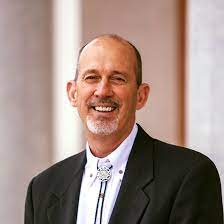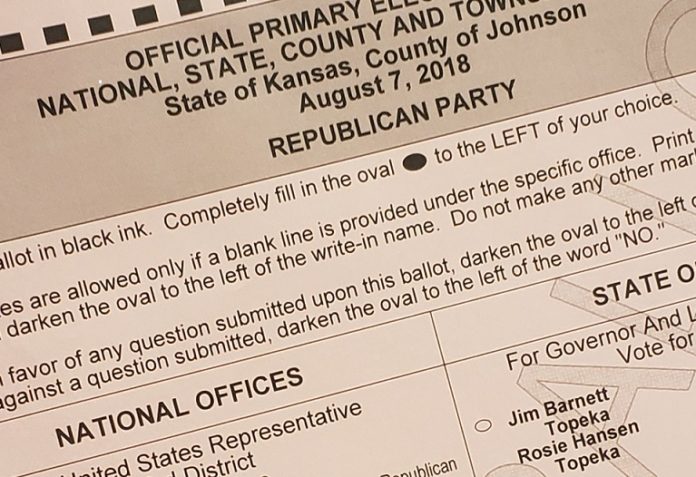(Will be updated as warranted)
The Kansas Senate on Tuesday voted down a bill that would have ended the three-day grace period for casting ballots by mail but was loaded with other measures requiring the state to hand count paper ballots and banning electronic voting machines.
The Senate voted 18-22 to reject the legislation that started as a bill setting the deadline for ballots to be cast by 7 p.m. on Election Day but was broadened significantly during the floor debate in the Senate a day earlier.
It expanded into something much more during Monday’s floor debate with amendments banning remote ballot drop boxes, requiring hand counting of paper ballots and banning electronic voting machines.
Another amendment would have required a voter with a driver’s license or identification that didn’t match their voter registration address to cast a provisional ballot. Those ballots would have to be looked at individually to determine if the vote should count.

The bill’s posture as the Senate adjourned Monday drew a rebuke from the Republican secretary of state who said the bill would end up undercutting voter confidence.
Republican state Rep. Mark Steffen successfully persuaded the Senate to approve a 20-page amendment that called for the state to hand count paper ballots for elections starting in 2025, a move that could have potentially lead to taking days to count votes. The amendment passed 17-15 on Monday.
The amendment also prohibited the purchase, lease, rental or use of electronic poll books and electronic vote tabulating equipment, including optical scanners. Under the bill, every ballot would have been marked with a serial number to ensure they aren’t duplicated.
Republican state Sen. Kellie Warren of Leawood voted against the bill Tuesday, although she had passed on the resolution a day earlier.
Warren said she supported the underlying bill that eliminated the three-day grace period and established 7 p.m. on Election as the deadline for voting.
She said that Steffen’s 20-page amendment that made broad changes to election law needed “extensive scrutiny via the legislative process.”
“While I understand those items can be fixed, I have to vote on the bill before me.
“As it stands now, as someone who believes we must thoroughly examine the impact of the laws we pass, I must vote, ‘No,'” she said.
In the past, Steffen has said he thought technology should be removed from the election system, saying that he’s appalled by the millions the state spends on computers.
“I’d much rather pay somebody $50,000 a year to have a pencil and a Big Chief notebook and tally votes or something along those lines,” Steffen said at an “election integrity” event held in Olathe two years ago with current Kansas Republican Party Chair Mike Brown.
During the floor debate Steffen embraced Johnson County voting activist Thad Snider, whom the senator considered to be “our foremost expert” in the state on elections although he’s known for fostering unfounded election conspiracy theories.
Snider was among a group of plaintiffs who filed a lawsuit to force the state to rerun the 2020 presidential election and force the attorney general to open a criminal investigation of Secretary of State Scott Schwab for “fraudulent election violations.”
The group sought to remove all electronic voting machines and ballot drop boxes for the 2022 election, a request that a federal judge denied, saying the request was long on hypothesis and short on facts.
Senators pressed Steffen for how he would expect election officials to hand count votes in a timely manner at election time.
Steffen said he thought election officials could complete a hand vote count on election night, much to the skepticism of other senators.
“It’s doable,” Steffen said. “You’ve got to travel back in time a little bit and relearn how they did it historically. It could be done before. It can clearly and easily be done again.
“You bring your manpower together. You organize ahead of time, and you get these ballots counted,” he said.
“It’s not difficult, and it’s certainly a lot cheaper than spending millions on machines that are open to hacking.”

Senate Minority Leader Dinah Sykes called the Hutchinson lawmaker’s prediction a “very optimistic interpretation.”
She recalled her first election in 2016 in Johnson County when vote counting lasted well into the next day. There was another similar delay in reporting results in 2018.
“I think this is actually going to cause more concern,” Sykes said.
“This may work in Hutch, but this would not work in Johnson County,” she said.
“I think we’re going to add probably four weeks in Johnson County to figure out what the preliminary numbers are.
“This is a solution in search of a problem we don’t have,” she said.
Senate President Ty Masterson said Steffen’s amendment would sink the underlying bill that addresses drop boxes and makes Election Day end on Election Day.
“A vote against the amendment is not a vote against the issue,” Masterson said. “It’s a vote to save the underlying bill. We need to have regulated drop boxes. We need to have Election Day. We need the counting to stop.
“Those are two things that I think we can do even over a veto,” Masterson said. “I don’t disagree with what’s been said, it’s just this amendment will put the anchor around this thing, and we need the underlying issue.”
Schwab criticized how the bill took on a much larger magnitude than how it started.
“It’s unfortunate that elected officials lack trust in the democratic system that brought them into office,” Schwab said in a statement.
“Today, the senate took action to further undermine voter confidence and compromise election integrity with the bill as amended,” he said.
“We encourage common sense to prevail before the final vote is cast.”
As it came to the Senate floor, the bill would have ended voting at 7 p.m. on Election Day, reversing a 2017 law that allows ballots postmarked on or before Election Day to be accepted until the Friday after the election.
Advocates for shortening the deadline argue that it assures the public that the election is run cleanly by only counting ballots that arrive by Election Day.
Supporters said the bill is intended to instill voter confidence in state elections, although there’s been no widespread evidence of fraudulent voting in Kansas.
Critics of the bill say it limits access to voting and discounts legitimate votes cast by Election Day, not after Election Day.
Last year, the House passed the legislation on a 77-45 vote, and the Senate passed the bill initially on a 23-14 vote.
Gov. Laura Kelly vetoed the bill last year, saying it would disenfranchise members of the military from casting a ballot. The Senate came up to two votes show of an override.
Meanwhile, Republican state Sen. Caryn Tyson of Parker got the bill amended so it would have banned advanced ballot drop boxes, which she said are vulnerable to fraud and vandalism.
“These remote boxes that are not monitored can be tampered with,” Tyson said.
“They can pour liquids in and destroy the ballots,” she said.
“We can have ballot harvesting where you can put hundreds of ballots in, which is against the law for a person to put over 10 ballots in,” she said.
“This would just help us enforce the current laws and protect the integrity of the ballots,” she said. “We need to make sure that those ballots are counted an accurate.”
Democratic state Sen. David Haley of Kansas City said he had not heard of reports about ballot box vandalism or fraud. He called the ballot boxes “effective and legal.”
“I haven’t heard of any tampering. I’m not saying that I’m well versed on every horror story of ballot collection that’s available, but I just haven’t heard.”
He questioned the value of eliminating drop boxes.
“The system is working very well,” Haley said. “I want each of us to ask, ‘Why would we really want to do away with something that’s effective and safe and has had no ill effect?’”
The secretary of state has defended the use of drop boxes, saying there’s no evidence of so-called ballot harvesting or any indication of fraud.













